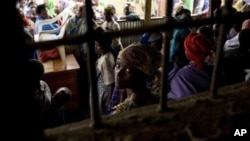Fighting in North Kivu province over the past two months has forced more than 200,000 people to flee their homes in the area.
The United Nations Office for the Coordination of Humanitarian Affairs, OCHA, says the increase of Internally Displaced People, IDPs, is a reflection of the large influx of new displacements during the second half of May and the confirmation those IDPs that were previously unreported.
Humanitarian agencies are straining to provide the necessary assistance to all who are in need.
“The increase of IDPs in being handled by a number of agencies and NGOs working in North Kivu,” says Yvon Edoumou, public information officer for Kinshasa’s OCHA office. “It is a collective response to ensure that the people who are displaced are able to get the necessary assistance they need, in terms of food, water, medication and protection from violence.”
The organization says IDPs have moved to areas like South and North Kivu, Goma, Uganda and Rwanda, leaving behind not only their belongings, but their livelihoods as well.
Edoumou says, “Many of the communities are farming communities and the violence has kept them from farming their land, not only to feed themselves, but as a source of economic means. So the humanitarian needs are great.”
Outside of the need for basic necessities, another major concern is cholera. OCHA has reported over 40,000 cases of cholera in the Democratic Republic of Congo over the last 18 months.
“DRC has been in the throes of the cholera epidemic which hasn’t’ subsided. There is concern it will not subside as people are still moving around and don’t have access to clean water. Also, we have to think about Malaria, and other contagious diseases,” says Edoumou.
With access made difficult by the insecurity and poor road conditions, a large number of people are still without aid.
Edoumou says, “We’ve been able to provide to those living in and around Goma and some of the camps we can easily access. But there is a large number of people who are living in the bushes we have not been able to reach.”
He says once the fighting subsides, teams of aid workers will be able to access these areas and provide people with the humanitarian assistance they need.
The United Nations Office for the Coordination of Humanitarian Affairs, OCHA, says the increase of Internally Displaced People, IDPs, is a reflection of the large influx of new displacements during the second half of May and the confirmation those IDPs that were previously unreported.
Humanitarian agencies are straining to provide the necessary assistance to all who are in need.
“The increase of IDPs in being handled by a number of agencies and NGOs working in North Kivu,” says Yvon Edoumou, public information officer for Kinshasa’s OCHA office. “It is a collective response to ensure that the people who are displaced are able to get the necessary assistance they need, in terms of food, water, medication and protection from violence.”
The organization says IDPs have moved to areas like South and North Kivu, Goma, Uganda and Rwanda, leaving behind not only their belongings, but their livelihoods as well.
Edoumou says, “Many of the communities are farming communities and the violence has kept them from farming their land, not only to feed themselves, but as a source of economic means. So the humanitarian needs are great.”
Outside of the need for basic necessities, another major concern is cholera. OCHA has reported over 40,000 cases of cholera in the Democratic Republic of Congo over the last 18 months.
“DRC has been in the throes of the cholera epidemic which hasn’t’ subsided. There is concern it will not subside as people are still moving around and don’t have access to clean water. Also, we have to think about Malaria, and other contagious diseases,” says Edoumou.
With access made difficult by the insecurity and poor road conditions, a large number of people are still without aid.
Edoumou says, “We’ve been able to provide to those living in and around Goma and some of the camps we can easily access. But there is a large number of people who are living in the bushes we have not been able to reach.”
He says once the fighting subsides, teams of aid workers will be able to access these areas and provide people with the humanitarian assistance they need.




